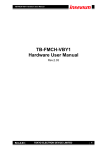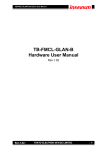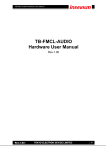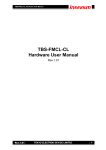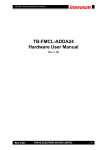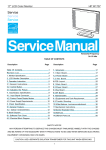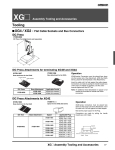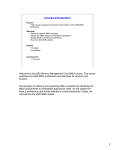Download TB-FMCL-LVDS Hardware User Manual
Transcript
TB-FMCL-LVDSxxx Hardware User Manual TB-FMCL-LVDS Hardware User Manual Rev.2.02 Rev.2.01 1 TB-FMCL-LVDSxxx Hardware User Manual Revision History Version Date Description Rev.1.00 2009/11/11 Initial release Nagatani Rev.2.00 2010/03/29 Release Version Yoshioka Rev.2.01 2010/06/03 Changed document format Yoshioka Rev.2.02 2010/10/07 Modified accessory Yoshioka Rev.2.01 Publisher 2 TB-FMCL-LVDSxxx Hardware User Manual Table of Contents 1. Related Documents and Board Accessories...................................................................................... 8 2. Overview ............................................................................................................................................ 8 3. Features ............................................................................................................................................. 8 4. Block Diagram .................................................................................................................................... 9 5. External View of the Board............................................................................................................... 10 6. Board Specification............................................................................................................................11 7. Description of Each Component ...................................................................................................... 12 7.1. Signal connection between LVDS and FMC connectors ......................................................... 12 7.2. Providing power to the LVDS connector .................................................................................. 14 7.3. Signals lines connected to the LVDS connector via resistors .................................................. 15 7.4. Signal switching between FMC and LVDS Connectors ........................................................... 15 7.5. General-Purpose Interface ....................................................................................................... 16 7.6. FMC Connector Signal Processing .......................................................................................... 17 7.6.1. Power Supply.................................................................................................................... 17 7.6.2. Test Points (TPs) .............................................................................................................. 17 7.6.3. Signal Ground Processing ................................................................................................ 17 8. Factory-Default Switch Settings ....................................................................................................... 18 9. An Example of Settings .................................................................................................................... 19 Rev.2.01 3 TB-FMCL-LVDSxxx Hardware User Manual List of Figures Figure3-1 FMC Connector Pin Layouts.............................................................................................. 8 Figure4-1 Block Diagram ................................................................................................................... 9 Figure5-1 Component Side .............................................................................................................. 10 Figure5-2 Solder Side ...................................................................................................................... 10 Figure6-1 Board Dimensions (inclusive of a wasteable portion).......................................................11 Figure7-1 A Structure of Voltage Selection....................................................................................... 14 Figure7-2 Structure for Signal Line Control...................................................................................... 15 Figure7-3 Structure for Signal Switching.......................................................................................... 15 Figure7-4 Structure of FMC CN Signal Ground Processing ............................................................ 17 Figure8-1 Component Side .............................................................................................................. 18 Figure9-1 Example of Settings......................................................................................................... 19 List of Tables Table7-1 Signal Connections between LVDS (CN1) and FMC (CN3) Connectors.......................... 12 Table7-2 Signal connections between LVDS (CN2) and FMC (CN3) connectors......................... 13 Table7-3 Voltage Selection............................................................................................................... 14 Table7-4 Mapping Table for Signal Line Control .............................................................................. 15 Table7-5 Mapping Table for Signal Switching .................................................................................. 16 Table7-6 General-Purpose Interface Pin Layout.............................................................................. 16 Table7-7 FMC Power Supply Pins ................................................................................................... 17 Table7-8 FMC CN Signal Test Pads................................................................................................. 17 Table7-9 FMC CN Ground Processing............................................................................................. 17 Table8-1 Factory Default Settings .................................................................................................... 18 Table9-1 Settings in the Example..................................................................................................... 19 Rev.2.01 4 TB-FMCL-LVDSxxx Hardware User Manual Introduction Thank you for purchasing the TB-FMCL-LVDS board. Before using the product, be sure to carefully read this user manual and fully understand how to correctly use the product. First read through this manual, then always keep it handy. SAFETY PRECAUTIONS Be sure to observe these precautions Observe the precautions listed below to prevent injuries to you or other personnel or damage to property. • Before using the product, read these safety precautions carefully to assure correct use. • These precautions contain serious safety instructions that must be observed. • After reading through this manual, be sure to always keep it handy. The following conventions are used to indicate the possibility of injury/damage and classify precautions if the product is handled incorrectly. Danger Indicates the high possibility of serious injury or death if the product is handled incorrectly. Indicates the possibility of serious injury or death if the product is handled Warning incorrectly. Indicates the possibility of injury or physical damage in connection with houses or Caution household goods if the product is handled incorrectly. The following graphical symbols are used to indicate and classify precautions in this manual. (Examples) Turn off the power switch. Do not disassemble the product. ! Rev.2.01 Do not attempt this. 5 TB-FMCL-LVDSxxx Hardware User Manual Warning In the event of a failure, disconnect the power supply. If the product is used as is, a fire or electric shock may occur. Disconnect the power supply immediately and contact our sales personnel for repair. If an unpleasant smell or smoking occurs, disconnect the power supply. If the product is used as is, a fire or electric shock may occur. immediately. Disconnect the power supply After verifying that no smoking is observed, contact our sales personnel for repair. Do not disassemble, repair or modify the product. Otherwise, a fire or electric shock may occur due to a short circuit or heat generation. For inspection, modification or repair, contact our sales personnel. ! Do not touch a cooling fan. As a cooling fan rotates in high speed, do not put your hand close to it. cause injury to persons. ! Otherwise, it may Never touch a rotating cooling fan. Do not place the product on unstable locations. Otherwise, it may drop or fall, resulting in injury to persons or failure. ! If the product is dropped or damaged, do not use it as is. ! Do not touch the product with a metallic object. ! Do not place the product in dusty or humid locations or where water may Otherwise, a fire or electric shock may occur. Otherwise, a fire or electric shock may occur. splash. Otherwise, a fire or electric shock may occur. ! ! Do not get the product wet or touch it with a wet hand. Otherwise, the product may break down or it may cause a fire, smoking or electric shock. Do not touch a connector on the product (gold-plated portion). Otherwise, the surface of a connector may be contaminated with sweat or skin oil, resulting in contact failure of a connector or it may cause a malfunction, fire or electric shock due to static electricity. Rev.2.01 6 TB-FMCL-LVDSxxx Hardware User Manual Caution Do not use or place the product in the following locations. ! • Humid and dusty locations • Airless locations such as closet or bookshelf • Locations which receive oily smoke or steam • Locations exposed to direct sunlight • Locations close to heating equipment • Closed inside of a car where the temperature becomes high • Staticky locations • Locations close to water or chemicals Otherwise, a fire, electric shock, accident or deformation may occur due to a short circuit or heat generation. ! Do not place heavy things on the product. Otherwise, the product may be damaged. ■ Disclaimer This product is a board intended for conversion between the Samtec FMC connector and the Hirose FX15 series connector. Tokyo Electron Device Limited assumes no responsibility for any damages resulting from the use of this product for purposes other than those stated. Even if the product is used properly, Tokyo Electron Device Limited assumes no responsibility for any damages caused by: (1) Earthquake, thunder, natural disaster or fire resulting from the use beyond our responsibility, acts by a third party or other accidents, the customer’s willful or accidental misuse or use under other abnormal conditions. (2) Secondary impact arising from use of this product or its unusable state (business interruption or others) (3) Use of this product against the instructions given in this manual. (4) Malfunctions due to connection to other devices. Tokyo Electron Device Limited assumes no responsibility or liability for: (1) Erasure or corruption of data arising from use of this product. (2) Any consequences or other abnormalities arising from use of this product, or (3) Damage of this product not due to our responsibility or failure due to modification This product has been developed by assuming its use for research, testing or evaluation. It is not authorized for use in any system or application that requires high reliability. Repair of this product is carried out by replacing it on a chargeable basis, not repairing the faulty devices. However, non-chargeable replacement is offered for initial failure if such notification is received within two weeks after delivery of the product. The specification of this product is subject to change without prior notice. The product is subject to discontinuation without prior notice. Rev.2.01 7 TB-FMCL-LVDSxxx Hardware User Manual 1. Related Documents and Board Accessories Related Documents: All documents relating to this board can be downloaded from our website. Please refer to attached paper of the products. Board accessories: - Twisted pair cable (straight cable) 50 cm cable: - x1 FMC spacer set M2.6 X 10 spacer (Duracon): x2 Screws with Duracon washer: x 4 - Jumper short-circuit socket Short-circuit socket: x12 2. Overview This board is intended to be used for conversion between the Samtec FMC connector and the Hirose FX15 series connector. This board support high speed differential signal interface to Low-pin count connector of evaluation boards. 3. Features FMC Connector: Samtec FMC Connector (Low-Pin Count) LVDS Connector: Hirose FX15 Series General-Purpose Interface: General-purpose 2.54 mm pitch connector Signal Switching: A jumper switch for switching signal lines Voltage Switching: A jumper switch for switching voltage Figure3-1 FMC Connector Pin Layouts Rev.2.01 8 TB-FMCL-LVDSxxx Hardware User Manual 4. Block Diagram Figure 4-1 shows a block diagram of the TB-FMCL-LVDS board. The FMC connector is mounted on the solder side of the board. A01 A40 FMC(Low Pin) A B C D E F G H J K K40 CN4 SEL ▲ 1 51 SEL 3.3V,GND 6pin 6pin 12V,3.3V,VADJ ●=GND 12Pair + 2Pair(CLK) SEL 3.3V,GND SEL ▲ 12V,3.3V,VADJ 12Pair + 2Pair(CLK) 6pin K01 1 CN2(LVDS CN) 51 CN1(LVDS CN) Figure4-1 Block Diagram Main Functions: 1. 14-pair differential signal connection between FMC connector and LVDS connector (CN1,CN2) 2. Signal (FMC connector), power and GND connection to the LVDS connector (CN1,CN2) 3. Provide power to the LVDS connector 4. General-purpose signal connector (CN4) output 5. Probe points Rev.2.01 9 TB-FMCL-LVDSxxx Hardware User Manual 5. External View of the Board Figure 5-1 and 5-2 show external views of the board. LVDS CN Signal Select Power Select General I/O Figure5-1 Component Side Figure5-2 Solder Side Rev.2.01 10 TB-FMCL-LVDSxxx Hardware User Manual 6. Board Specification External Dimensions: 115 mm (W) x 69 mm (H) Layer Structure: 8-layer Board Thickness: 1.6 mm Material: FR-4 FMC Connector: Samtec ASP-134604-01 LVDS Connector: Hirose FX15SC-51S-0.5SH General-Purpose Interface: Omron XG8W-1031 Figure6-1 Board Dimensions (inclusive of a wasteable portion) Rev.2.01 11 TB-FMCL-LVDSxxx Hardware User Manual 7. Description of Each Component 7.1. Signal connection between LVDS and FMC connectors Table 1 shows signal connection between the LVDS connector and the Samtec low-pin-count FMC connector mounted on the solder side of the board. Table7-1 Signal Connections between LVDS (CN1) and FMC (CN3) Connectors LVDS CN Pin No. 1,2,3,4,5 6 FMC CN Signal Name - Pin No. * Open 7,8,9,16,19,24,31,34,39 - - 42,48,51 Pin Name 1 - - - GND 2 * GND 10 A_TLA0_N H8 LA02_N 11 A_TLA0_P H7 LA02_P 12 A_TLB0_N H11 LA04_N 13 A_TLB0_P H10 LA04_P 14 A_TLC0_N H14 LA07_N 15 A_TLC0_P H13 LA07_P 17 A_TLCLK0_N H5 CLK0_M2C_N 18 A_TLCLK0_P H4 CLK0_M2C_P 20 A_TLD0_N H17 LA11_N 21 A_TLD0_P H16 LA11_P 22 A_TLE0_N H20 LA15_N 23 A_TLE0_P H19 LA15_P 25 A_TLA1_N H23 LA19_N 26 A_TLA1_P H22 LA19_P 27 A_TLB1_N H26 LA21_N 28 A_TLB1_P H25 LA21_P 29 A_TLC1_N H29 LA24_N 30 A_TLC1_P H28 LA24_P 32 A_TLCLK1_N H32 LA28_N 33 A_TLCLK1_P H31 LA28_P 35 A_TLD1_N H35 LA30_N 36 A_TLD1_P H34 LA30_P 37 A_TLE1_N H38 LA32_N 38 A_TLE1_P H37 40 41 43 44 45 46 47 49 50 Rev.2.01 A_TLF0_N A_TLF0_P A_OP0 A_OP1 A_OP2 A_OP3 A_OP4 A_TLF1_N A_TLF1_P LA32_P 3 LA31_N 3 LA31_P G34 * G33 * 4 - 4 - 4 - 4 - * * * * 4 * 3 LA33_N 3 LA33_P G37 * G36 * 12 TB-FMCL-LVDSxxx Hardware User Manual 1 * JP1 is used to select either 12V, 3.3V or VADJ. For details, see Providing power to the LVDS connector in section 7.2. 2 * These signal lines are connected to GND using zero-ohm resistors For details, see Signal lines connected to the LVDS connector via resistors in section 7.3 3 * These signal lines are connected to the connector using zero-ohm resisters. For details, see Signal lines connected to the LVDS connector via resistors in section 7.3 4 * JP2 through JP6 are used to change the destinations to be connected. For details, see Switching signals between FMC and LVDS connectors in section 7.4. Table7-2 Signal connections between LVDS (CN2) and FMC (CN3) connectors LVDS CN Pin No. 1,2,3,4,5 6 FMC CN Signal Name - Pin No. * Open 7,8,9,16,19,24,31,34,39 - - 42,48,51 Pin Name 1 - - - GND 2 * GND 10 B_TLA0_N D9 LA01_N_CC 11 B_TLA0_P D8 LA01_P_CC 12 B_TLB0_N C11 LA06_N 13 B_TLB0_P C10 LA06_P 14 B_TLC0_N D12 LA05_N 15 B_TLC0_P D11 LA05_P 17 B_TLCLK0_N G3 CLK1_M2C_N 18 B_TLCLK0_P G2 CLK1_M2C_P 20 B_TLD0_N G7 LA00_N_CC 21 B_TLD0_P G6 LA00_P_CC 22 B_TLE0_N D15 LA09_N 23 B_TLE0_P D14 LA09_P 25 B_TLA1_N C15 LA10_N 26 B_TLA1_P C14 LA10_P 27 B_TLB1_N D18 LA13_N 28 B_TLB1_P D17 LA13_P 29 B_TLC1_N C19 LA14_N 30 B_TLC1_P C18 LA14_P 32 B_TLCLK1_N D21 LA17_N_CC 33 B_TLCLK1_P D20 LA17_P_CC 35 B_TLD1_N C23 LA18_N_CC 36 B_TLD1_P C22 LA18_P_CC 37 B_TLE1_N D24 LA23_N 38 B_TLE1_P D23 40 41 43 44 45 Rev.2.01 B_TLF0_N B_TLF0_P B_OP0 B_OP1 B_OP2 LA23_P D27 * 3 LA26_N D26 * 3 LA26_P 4 - 4 - 4 - * * * 13 TB-FMCL-LVDSxxx Hardware User Manual LVDS CN Pin No. 46 * B_TLF1_P Pin Name - 4 B_TLF1_N 50 * * B_OP4 49 Pin No. 4 B_OP3 47 1 FMC CN Signal Name - C27 * 3 LA27_N C26 * 3 LA27_P JP7 is used to select either 12V, 3.3V or VADJ. For details, see Providing power to the LVDS connector in section 7.2. 2 * These signal lines are connected to GND using zero-ohm resistors For details, see Signal lines connected to the LVDS connector via resistors in section 7.3 3 * 4 * These signal lines are connected to the connector using zero-ohm resisters. For details, see Signal lines connected to the LVDS connector via resistors in section 7.3 JP8 through JP12 are used to change the destinations to be connected. For details, see Switching signals between FMC and LVDS connectors in section 7.4. 7.2. Providing power to the LVDS connector Power can be provided to the LVDS connector by selecting 12V, 3.3V or VADJ that is supplied from the FMC connector. The selected supply voltage can be monitored at the test points TH1 and TH2. The structure of voltage selection is shown in Figure 7-1 and voltage selection method in Table 3. Figure7-1 A Structure of Voltage Selection Table7-3 Voltage Selection Rev.2.01 CN: Pin No. JP CN1: 1,2,3,4,5 CN2: 1,2,3,4,5 Connect Test Point 1-2 3-4 5-6 JP1 12V VADJ 3.3V TH1 JP7 12V VADJ 3.3V TH2 14 TB-FMCL-LVDSxxx Hardware User Manual 7.3. Signals lines connected to the LVDS connector via resistors Figure 7-2 shows a circuit of LVDS connector. Some signals and ground connect to the LVDS connector via resistors. These resistors are mounted at shipment. To disconnect any of the signal lines, remove the associated resistors from the lines. Figure7-2 Structure for Signal Line Control Table7-4 Mapping Table for Signal Line Control LVDS CN CN No. CN1 CN2 7.4. Pin No. Resistor # Connect 40 (A_TLF0_N) R11 FMC G34 (LA31_N) 41 (A_TLF0_P) R12 FMC G33 (LA31_P) 42 R13 GND 48 R14 GND 49 (A_TLF1_N) R15 FMC G37 (LA33_N) 50 (A_TLF1_P) R16 FMC G36 (LA33_P) 51 R17 GND 40 (B_TLF0_N) R28 FMC D27 (LA26_N) 41 (B_TLF0_P) R29 FMC D26 (LA26_P) 42 R30 GND 48 R31 GND 49 (B_TLF1_N) R32 FMC C27 (LA27_N) 50 (B_TLF1_P) R33 FMC C26 (LA27_P) 51 R34 GND Signal switching between FMC and LVDS Connectors Figure 7-3 shows a structure for switching signals between FMC and LVDS connectors. Table 5 provides a mapping table for signal switching. Figure7-3 Structure for Signal Switching Rev.2.01 15 TB-FMCL-LVDSxxx Hardware User Manual Table7-5 Mapping Table for Signal Switching LVDS CN 7.5. JP Connect 1-2 3-4 5-6 CN1 43(A_OP0) JP2 3.3V FMC G25(LA22_N) GND CN1 44(A_OP1) JP3 3.3V FMC G27(LA25_P) GND CN1 45(A_OP2) JP4 3.3V FMC G28(LA25_N) GND CN1 46(A_OP3) JP5 3.3V FMC G30(LA29_P) GND CN1 47(A_OP4) JP6 3.3V FMC G31(LA29_N) GND CN2 43(B_OP0) JP8 3.3V FMC G9(LA03_P) GND CN2 44(B_OP1) JP9 3.3V FMC G10(LA03_N) GND CN2 45(B_OP2) JP10 3.3V FMC G12(LA08_P) GND CN2 46(B_OP3) JP11 3.3V FMC G13(LA08_N) GND CN2 47(B_OP4) JP12 3.3V FMC G15(LA12_P) GND General-Purpose Interface The board provides an onboard 10-pin, 2.54mm pitch header (CN4), to which 6 FMC connector signal pins are connected. Table7-6 General-Purpose Interface Pin Layout FMC Rev.2.01 CN4 FMC Pin No. (Name) Pin No. Pin No. Pin No. (Name) GND 1 2 GND G18 (LA16_P) 3 4 G19 (LA16_N) G21 (LA20_P) 5 6 G22 (LA20_N) G24 (LA22_P) 7 8 G16 (LA12_N) NC 9 10 NC 16 TB-FMCL-LVDSxxx Hardware User Manual 7.6. FMC Connector Signal Processing The following signal processing is implemented for the FMC connector pins. 7.6.1. Power Supply Three different types of power (12V, 3.3V and VADJ) are provided from the FMC connector. They can be monitored at the test points (TH3 through TH5) shown in Table 7. Table7-7 FMC Power Supply Pins FMC Pin No. Power Test Point C35,C37 12V TH5 C39,D32,D36,D38,D40 3.3V TH3 V ADJ TH4 G39,H40 7.6.2. Test Points (TPs) The board provides on-board test pads (TPs) to monitor the FMC connector pins. Table7-8 FMC CN Signal Test Pads FMC Pin No. Pin No. Pin Name Test PAD C34 GA0 TP1 D35 GA1 TP2 H1 VREF_A_M2C TP3 7.6.3. Signal Ground Processing The board provides the structure of ground processing for the FMC connector pins. The resistors shown in Figure 7-4 are not mounted at shipment. Figure7-4 Structure of FMC CN Signal Ground Processing Table7-9 FMC CN Ground Processing FMC Pin No. Pin No. Rev.2.01 Pin Name Resistor D1 PG_C2M R35 H2 PRSNT_M2C_L R36 17 TB-FMCL-LVDSxxx Hardware User Manual 8. Factory-Default Switch Settings Figure 8-1 shows the factory-default switch settings. Look at the switch settings encompassed with dotted lines. Signal Select ALL Open Power Select ALL Open Figure8-1 Component Side Table8-1 Factory Default Settings No. Silk No. Initial Setting 1 JP1 Open Voltage selection (12V / VADJ / 3.3V) 2 JP2 Open Signal Selection (3.3V / Signal / GND) 3 JP3 Open Signal Selection (3.3V / Signal / GND) 4 JP4 Open Signal Selection (3.3V / Signal / GND) 5 JP5 Open Signal Selection (3.3V / Signal / GND) 6 JP6 Open Signal Selection (3.3V / Signal / GND) 7 JP7 Open Voltage selection (12V / VADJ / 3.3V) 8 JP8 Open Signal Selection (3.3V / Signal / GND) 9 JP9 Open Signal Selection (3.3V / Signal / GND) 10 JP10 Open Signal Selection (3.3V / Signal / GND) 11 JP11 Open Signal Selection (3.3V / Signal / GND) 12 JP12 Open Signal Selection (3.3V / Signal / GND) Rev.2.01 Function 18 TB-FMCL-LVDSxxx Hardware User Manual 9. An Example of Settings Figure 9-1 shows an example of settings when performing a loopback test within the board. Be careful about the jumper settings of the TB-6S-LX150T-IMG main board. All pins are open JP2 1-2 JP6,7 Open Figure9-1 Example of Settings Table9-1 Settings in the Example No. Silk No. Setting 1 JP2 1-2 2 JP6,7 Non Function Bank2 voltage setting (2.5V / 3.3V) FMC3 VADJ voltage setting (2.5V / 3.3V / 5V / no voltage) (these jumper settings must be the same) * The values indicated by boldface in the Function field show the settings in the example. Rev.2.01 19 TB-FMCL-LVDSxxx Hardware User Manual PLD Solution Division URL: http://www.inrevium.jp/eng/x-fpga-board/ E-mail: [email protected] HEAD Quarter : Yokohama East Square, 1-4 Kinko-cho, Kanagawa-ku, Yokohama City, Kanagawa, Japan 221-0056 TEL:+81-45-443-4016 FAX:+81-45-443-4058 Rev.2.01 20
























